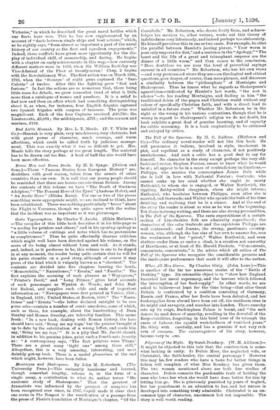The Pall of the Sparrow. By M. C. Balfour. (Methuen
and Co.)—The ordinary novel-reader will not like this book. He will pronounce it tedious, involved in style, incoherent in plot, and repellent as a study of character, if not positively unwholesome. And such a critic has a good deal to say for himself. No character in the story except perhaps the very old- fashioned rector, Stephen Forster, seems to know what he would be at ; all appear to be in a maze of contradictory inclinations,— Philippa, who marries the commonplace James Dale while she is half in love with Nathaniel Forster ; Gertrude, who cannot make up her mind whether she ought to marry Nathaniel, to whom she is engaged, or Walter Borthwick, the tippling, flabby-willed clergyman, whom she might reform ; Nathaniel, who hesitates between Philippa, even after she is married, and Gertrude; and Walter who spends the bulk of his time drinking and realising that he is a sinner. And at the end of the story the reader is about as wise as he was at the beginning. Yet there is strong writing, and there are also strong personalities, in The Fall of the Sparrow. The eerie superstitions of a certain section of Lincolnshire folk are admirably reproduced; the characters of the calm Gertrude and the capricious Philippa are well contrasted ; and Joanne, the strong, passionate country- woman, who, although she has sins of her own to answer for, sees the weaknesses of her "priest," Walter Borthwick, and even shelters under them as under a cloak, is a creation not unworthy of Hawthorne, or at least of Mr. Harold Frederic. "Concentrate, concentrate, concentrate," is the advice which all critics of The Pall of the Sparrow who recognise the considerable promise and the inadequate performance that mark it will offer to the author.










































 Previous page
Previous page